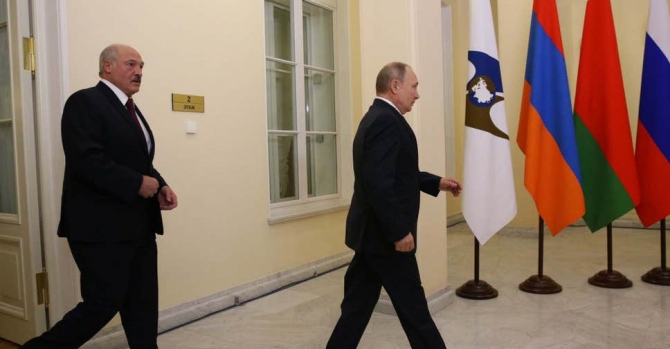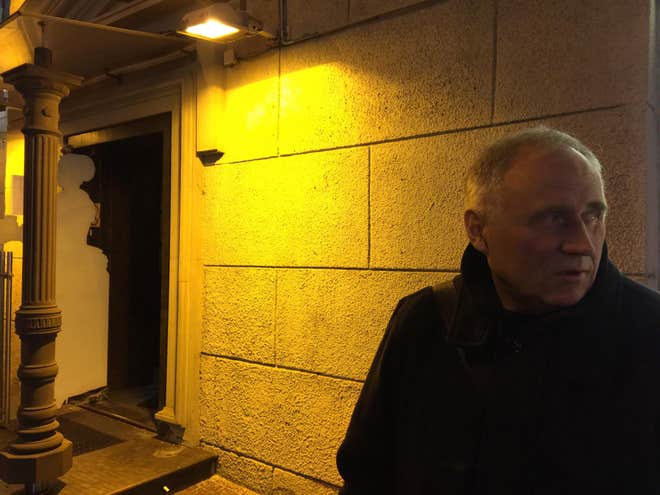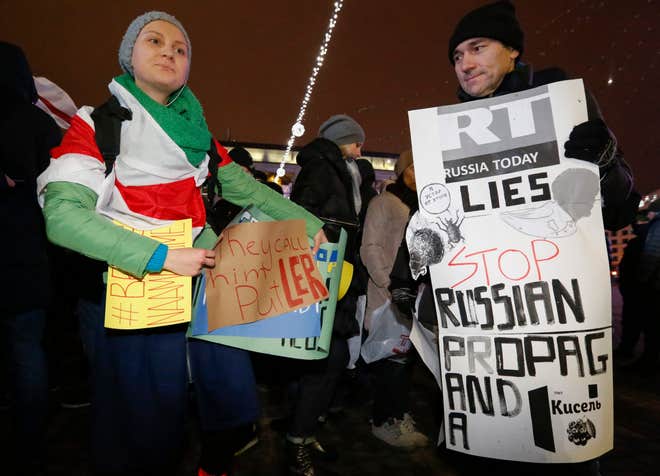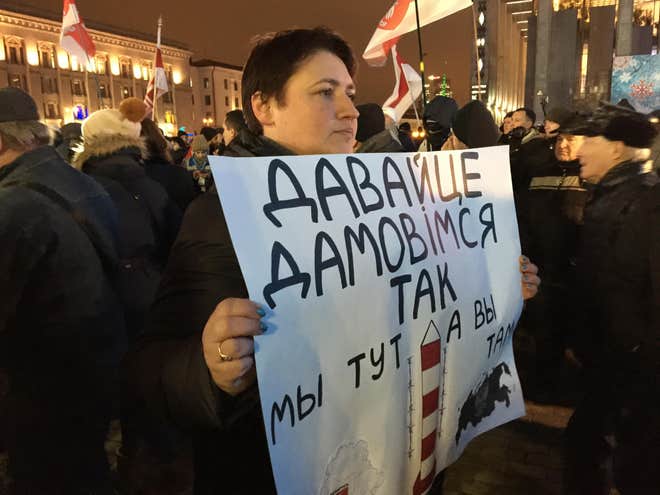With Moscow closing in, is luck finally running out for Belarusian ‘dictator’ Alexander Lukashenko?
Oliver Carroll, Independent
23 January 2020, 23:47
 He may have finally met his match in Vladimir Putin
He may have finally met his match in Vladimir Putin
Some 25 years ago, Alexander Lukashenko was elected as president in the first ever democratic elections in Belarus. He was 39. Since then, there have been no further such elections, only clampdowns, protests, tweaked constitutions, alleged assassinations and the founding of an authoritarian system described as the last dictatorship of Europe.
But over the years, the former collective farm director, now 65, has excelled as a wily tactician and survivor. Swinging from one seemingly existential crisis to the next, Mr Lukashenko has always found a way to emerge from negotiations unscathed and emboldened.
He has balanced between Russia and Europe; joined a “union” state but refused to host Russian military bases nor recognise Crimea; benefitted from massive oil and gas preferences amounting to tens of billions of pounds from Moscow but negotiated a separate trade partnership with China.
As a result, Mr Lukashenko has been able to build his resource-poor country in the image of his collective farm dreams: a scale model of the Soviet Union, where, almost uniquely in the region, everything seems to work.
Yet there is a growing sense that in negotiations with Vladimir Putin, Mr Lukashenko might finally have met his match.
The two men have famously never got on, but in recent times the relationship has become decidedly frosty, with Mr Putin looking to extract more concessions from his unreliable ally.
In his annual news conference on Thursday, the Russian president seemed to issue an ultimatum. Belarus would get no gas discounts while “union building [was] incomplete”, he said. Put another way: either Mr Lukashenko agrees to an unpopular closer merging with Russia or he faces the loss of subsidy and the prospect of a political implosion at home.
Talks in St Petersburg this weekend produced a predictable stalemate, with Mr Lukashenko facing a seemingly impossible challenge.
![With Moscow closing in, is luck finally running out for Belarusian ‘dictator’ Alexander Lukashenko?]()
One man with little sympathy for his predicament is Mikola Statkevich, a former presidential candidate who has spent eight of the last 20 years behind bars at Mr Lukashenko’s pleasure.
Speaking with The Independent in Minsk on Friday, just before an opposition protest against the joint state, Mr Statkevich said the Belarusian strongman had only himself to blame after “trading away” the country’s sovereignty in exchange for oil and gas.
President Lukashenko was heading for “disaster” because he refused to open up the country to reform, Mr Statkevich said: “If he does what I think he’s going to do, then Gaddafi’s fate will seem merciful. Lukashenko has many enemies, many people who have patiently hated him for years.”
On Thursday, the opposition leader reported what he claimed was an attempted “poisoning”. He told The Independent he experienced a sudden and severe “allergic reaction” which caused his throat to swell and restrict his breathing. His wife, a doctor, was fortunately on hand to administer an anti-allergic injection, he said, and the swelling subsided.
It was a strange episode, he admitted. He could not be sure how or when he was poisoned, but he was not the only opposition politician in Belarus to experience such strange symptoms. Alexei Navalny, the most prominent opposition leader in Russia, earlier this year also reported a similar experience.
“I don’t believe in coincidences,” he said. “It was designed as a warning.”
President Lukashenko has denied such dirty tricks in dealing with opponents. In a 2012 interview with The Independent, he described himself as a “democrat” who valued “personal freedom”. But the fact remains that some of his rivals have been imprisoned for long periods of time, have disappeared, or have been forced into exile.
Last week, Yuri Garavsky, a former Belarusian special forces officer, went public with sensational claims that he took part in special operations to assassinate Mr Lukashenko's rivals two decades ago.
Mr Statkevich said the revelations came as no surprise to opposition leaders like himself. Mr Garavsky was "undoubtedly" telling the truth, he said. But the reports, which came on the eve of talks, seemed designed to deliberately weaken the Belarusian president's negotiating position.
"Perhaps he was put up to it by Russian sympathisers within the Belarusian government, or perhaps it was the Kremlin," Mr Statkevich said.
![]()
The level of support for the Belarusian opposition inside the country is unclear, with many Belarusians understandably choosing to steer clear of politics. At the same time, there are signs that may be changing. In 2017, a controversial plan to introduce a charge on the unemployed for “lost tax” led to mass protests and radicalised at least part of the population. Unease about the prospect of a merger with Russia has raised the stakes further.
Plans for a joint state between Belarus and Russia are the legacy of a very different era. Signed in the mid-Nineties, they were the expression of a close relationship between Mr Lukashenko and the ailing Russian president Boris Yeltsin. They envisaged merging of fiscal rules, national institutions, and even the military. But they have never been fully enacted.
It seems probable Mr Lukashenko once imagined a role for himself atop the superstate. But two circumstances conspired to work against that prospect: opposition protests over 1999-2000, which he dealt with clinically but which damaged his reputation; and the emergence of Vladimir Putin in Moscow. There could be no room for two such strong personalities at the top.
Some have even speculated that Mr Putin may now himself be eyeing presidency of the unified superstate as a way to stay on after his constitutional term expires in 2024.
Even if true, such considerations play a secondary role to geopolitics.
They are, at most, a fortuitous “side-effect”, said Arsen Sivitski, director of the Centre for Strategic and Foreign Policy Studies, a Minsk-based think tank. Instead, the main rationale behind Moscow’s strong-arming was to keep Belarus, its closest ally, “within a manageable orbit”.
“The Russian intelligence community sees a threat that Minsk may tilt towards Europe, and they will be left with the same problem they had in Ukraine in 2013,” Mr Sivitski said. “Moscow is acting preventatively, as it sees it. It wants to have institutional instruments in place to control things if they get out of hand.”
![]()
A large proportion of the 200 or so who turned up to a protest against a closer union with Russia on Friday admitted it was the Ukrainian scenario that they were most afraid of.
“Russia says it a brotherly country, but it hasn’t been very brotherly with Ukraine,” said Svetlana Kovalenko, 40, an economist.
“But maybe they won’t need tanks with us. Maybe they will simply swallow up our country gradually by signing documents.”
23 January 2020, 23:47

Alexander Lukashenko and Vladimir Putin in St Petersburg on Friday ( Getty )
Some 25 years ago, Alexander Lukashenko was elected as president in the first ever democratic elections in Belarus. He was 39. Since then, there have been no further such elections, only clampdowns, protests, tweaked constitutions, alleged assassinations and the founding of an authoritarian system described as the last dictatorship of Europe.
But over the years, the former collective farm director, now 65, has excelled as a wily tactician and survivor. Swinging from one seemingly existential crisis to the next, Mr Lukashenko has always found a way to emerge from negotiations unscathed and emboldened.
He has balanced between Russia and Europe; joined a “union” state but refused to host Russian military bases nor recognise Crimea; benefitted from massive oil and gas preferences amounting to tens of billions of pounds from Moscow but negotiated a separate trade partnership with China.
As a result, Mr Lukashenko has been able to build his resource-poor country in the image of his collective farm dreams: a scale model of the Soviet Union, where, almost uniquely in the region, everything seems to work.
Yet there is a growing sense that in negotiations with Vladimir Putin, Mr Lukashenko might finally have met his match.
The two men have famously never got on, but in recent times the relationship has become decidedly frosty, with Mr Putin looking to extract more concessions from his unreliable ally.
In his annual news conference on Thursday, the Russian president seemed to issue an ultimatum. Belarus would get no gas discounts while “union building [was] incomplete”, he said. Put another way: either Mr Lukashenko agrees to an unpopular closer merging with Russia or he faces the loss of subsidy and the prospect of a political implosion at home.
Talks in St Petersburg this weekend produced a predictable stalemate, with Mr Lukashenko facing a seemingly impossible challenge.

Mikola Statkevich, a nemesis of Lukashenko, has spent eight of the last 20 years in prison for his role in organising protests (Oliver Carroll/The Independent)
One man with little sympathy for his predicament is Mikola Statkevich, a former presidential candidate who has spent eight of the last 20 years behind bars at Mr Lukashenko’s pleasure.
Speaking with The Independent in Minsk on Friday, just before an opposition protest against the joint state, Mr Statkevich said the Belarusian strongman had only himself to blame after “trading away” the country’s sovereignty in exchange for oil and gas.
President Lukashenko was heading for “disaster” because he refused to open up the country to reform, Mr Statkevich said: “If he does what I think he’s going to do, then Gaddafi’s fate will seem merciful. Lukashenko has many enemies, many people who have patiently hated him for years.”
On Thursday, the opposition leader reported what he claimed was an attempted “poisoning”. He told The Independent he experienced a sudden and severe “allergic reaction” which caused his throat to swell and restrict his breathing. His wife, a doctor, was fortunately on hand to administer an anti-allergic injection, he said, and the swelling subsided.
It was a strange episode, he admitted. He could not be sure how or when he was poisoned, but he was not the only opposition politician in Belarus to experience such strange symptoms. Alexei Navalny, the most prominent opposition leader in Russia, earlier this year also reported a similar experience.
“I don’t believe in coincidences,” he said. “It was designed as a warning.”
President Lukashenko has denied such dirty tricks in dealing with opponents. In a 2012 interview with The Independent, he described himself as a “democrat” who valued “personal freedom”. But the fact remains that some of his rivals have been imprisoned for long periods of time, have disappeared, or have been forced into exile.
Last week, Yuri Garavsky, a former Belarusian special forces officer, went public with sensational claims that he took part in special operations to assassinate Mr Lukashenko's rivals two decades ago.
Mr Statkevich said the revelations came as no surprise to opposition leaders like himself. Mr Garavsky was "undoubtedly" telling the truth, he said. But the reports, which came on the eve of talks, seemed designed to deliberately weaken the Belarusian president's negotiating position.
"Perhaps he was put up to it by Russian sympathisers within the Belarusian government, or perhaps it was the Kremlin," Mr Statkevich said.

Protesters against the deepening of Belarus-Russia integration in Minsk on Friday (EPA)
The level of support for the Belarusian opposition inside the country is unclear, with many Belarusians understandably choosing to steer clear of politics. At the same time, there are signs that may be changing. In 2017, a controversial plan to introduce a charge on the unemployed for “lost tax” led to mass protests and radicalised at least part of the population. Unease about the prospect of a merger with Russia has raised the stakes further.
Plans for a joint state between Belarus and Russia are the legacy of a very different era. Signed in the mid-Nineties, they were the expression of a close relationship between Mr Lukashenko and the ailing Russian president Boris Yeltsin. They envisaged merging of fiscal rules, national institutions, and even the military. But they have never been fully enacted.
It seems probable Mr Lukashenko once imagined a role for himself atop the superstate. But two circumstances conspired to work against that prospect: opposition protests over 1999-2000, which he dealt with clinically but which damaged his reputation; and the emergence of Vladimir Putin in Moscow. There could be no room for two such strong personalities at the top.
Some have even speculated that Mr Putin may now himself be eyeing presidency of the unified superstate as a way to stay on after his constitutional term expires in 2024.
Even if true, such considerations play a secondary role to geopolitics.
They are, at most, a fortuitous “side-effect”, said Arsen Sivitski, director of the Centre for Strategic and Foreign Policy Studies, a Minsk-based think tank. Instead, the main rationale behind Moscow’s strong-arming was to keep Belarus, its closest ally, “within a manageable orbit”.
“The Russian intelligence community sees a threat that Minsk may tilt towards Europe, and they will be left with the same problem they had in Ukraine in 2013,” Mr Sivitski said. “Moscow is acting preventatively, as it sees it. It wants to have institutional instruments in place to control things if they get out of hand.”

Economist Svetlana Kovalenko holds a sign at a rally against integration with Russia. “Let’s do a deal,” it reads. “We stay here and you stay there.” (Oliver Carroll/The Independent)
A large proportion of the 200 or so who turned up to a protest against a closer union with Russia on Friday admitted it was the Ukrainian scenario that they were most afraid of.
“Russia says it a brotherly country, but it hasn’t been very brotherly with Ukraine,” said Svetlana Kovalenko, 40, an economist.
“But maybe they won’t need tanks with us. Maybe they will simply swallow up our country gradually by signing documents.”

